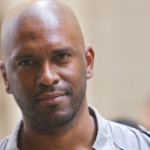This week marks a landmark in independent theater in Philadelphia: the inaugural production by Orbiter 3, a new producing playwrights collective. Over the next three years, the company will produce six new plays (one from each of the collective’s existing five writers and one by an additional local playwright). They kick things off with MOON MAN WALK by James Ijames, an award-winning actor and director and the author of acclaimed recent work The Most Spectacularly Lamentable Trial of Miz Martha Washington (Flashpoint Theater, 2014).

MOON MAN WALK stars Lindsay Smiling as Monarch, a young man who returns home to plan his mother’s funeral, a “magical journey through space and time that takes us literally from Philadelphia to the moon and back”. A Chicago native, Lindsay came to Philadelphia to pursue an MFA at Temple. After a stint in New York, he is back in Philly full time. A regular at the Wilma, he’s also been seen recently at the Arden (Great Expectations), Theatre Exile (North of the Boulevard), and Tiny Dynamite (A Number). Lindsay talked to Phindie about MOON MAN WALK, Michael Jackson, and life and the stage in Philadelphia. [Prince Theater, Independence Black Box, 1412 Chestnut Street] June 27-July 3, 2015; orbiter3.org.
Phindie: What attracted you to MOON MAN WALK? Tell me a little about the play.
Lindsay Smiling: James had asked me to do a reading of MOON MAN WALK last year. As you know James Ijames is not only an incredibly talented actor and director but a very beautiful playwright. So I jumped at the chance work on and help develop one of his pieces. After working a little bit on it for the reading and finding out how personal a play this is for him I felt honored to be asked to do the full production with Orbiter 3. The play revolves around Monarch, a librarian who has never really developed socially as a man and “lives his life as a mighty man-boy”. The sudden death of his mother launches him on a journey of grief, love and maturing.
Phindie: Do you have to do Michael Jackson’s moonwalk in it?
LS: While there is a little bit of dancing, and I do mean little, there is no moonwalk a la Michael Jackson in the show. And that is probably a good thing because my Michael Jackson moves are dismal.
Phindie: You grew up in Chicago and lived in New York. As a theater artist, why choose Philadelphia over the two biggest theater cities in the country?

LS: Philadelphia has a lot to offer for theater artists and doesn’t get as much national attention as I think it deserves. My time up in New York was amazing. I love that city and it has a ton of art everywhere. As I matured as an actor I developed a different set of priorities. A few seasons ago I came down to see the opening night of Our Class at the Wilma. I found myself both very moved and curious about how it was conceived. When Blanka talked about bringing in international artists for workshops to further the craft of the actors in the community, I wanted in. Plus I already had a connection with many of the theaters in Philly so the move made a lot of sense. I grew up just outside of Chicago and I still fantasize about moving back there to be closer to family. That would mean a major transition in my career that I’m not ready to make. I have more professional roots in Philadelphia and really like home. But make no mistake, I will always root for Da Bears!
Phindie: Why do you think Orbiter 3 is such a valuable addition to the Philadelphia theater scene?
LS: The fact that Orbiter 3 exists is awesome. Any theater community that has a strong presence of original work is doing something right. While many companies in Philadelphia will produce new plays in their seasons often from local playwrights, it’s fantastic to have a group devoted exclusively to producing their own scripts. My only wish is that the Orbiter 3 collective could last for more than three seasons.
Phindie: Where else do you see room for growth in the city’s theater?
LS: It’s fantastic that James is a part of this group because one area I feel the Philadelphia theater community needs work on is the number of minorities on the production and casting side. I’m so thankful that, for the most part, all of the major theaters in town make it a point to choose plays with minorities as focal characters on a fairly consistent basis. Still there is a serious lack of minority voices . I would love to see New Freedom Theater play a more prominent role in the community. It’s not that any particular theater is doing anything wrong per se, rather I feel there is a missing part of the theater conversation in this city that I hope to see filled.
Phindie: You were last onstage in the Wilma’s Hamlet and Rosencrantz and Guildenstern Are Dead. What did you enjoy about working with Blanka Zizka on this ambitious dual project?
LS: The work being done at the Wilma is one of the biggest reasons I moved back to Philly. Blanka’s aggressive pursuit to dive deeper into what the actor is capable of is such a thrill to be involved with. She is constantly questioning not only the possibilities of the theater but also where the creative impulse of art lives as a performer. She is incredibly interested in the physicality of the actor. Thinking with the body and placing the intellect as a secondary guide. The length of time for this particular project at the Wilma has allowed a physical exploration that few other productions are afforded. Typically a director will have an idea of the movement of the actors in any given scene before rehearsals even start. Much of what you saw with Hamlet and Rosencrantz and Guildenstern are Dead was created out of physical improvisation in rehearsals and workshops.
Phindie: How does Ed Sobel’s directing style compare?
LS: The work Blanka is interested in demands the actor to rid themselves of their autobiography, fully be in their body, and transform to serve the play. Similarly Ed has a tremendous amount of awareness of the physicality of his actors. While Blanka has been working with Jean-Rene Toussaint and more recently Theodoros Terzopoulos to gain access to the body, Ed has an extensive backround in dramaturgy and is incredibly intelligent about the emotional journey of the play. However he also uses viewpoints to allow the actor to gain awareness of their body in relationship to the space and other actors. So both are concerned with physicality on stage, but they approach it with a different vocabulary. And for the record I consider them both rock stars.
Phindie: How do you like working with a living, local playwright?
LS: It’s always exciting to work on a new play. Especially when the playwright is around to make changes based on discoveries made in the rehearsal room. It takes a slightly different approach to exploring a new script. When you start working on a text that has been published and locked in, you often come across pieces of dialogue that don’t immediately make sense with your perception of the play. Unlocking these tricky sections of the play often launches me into a deeper, more complex and fuller understanding of the characters journey. These are thrilling, magical moments and often make for powerful theater. So you have to balance suggesting changes to the script for clarity’s sake with giving enough time to unlock those moments that might initially feel awkward but are the true gems in the script .
Phindie: What are your three dream roles?
LS: Only three?! Okay well this list might change tomorrow. I’ve been dying to take on Lincoln from Topdog/Underdog by Suzan Lori-parks. Boy Willie from Piano Lesson I consider to be the epitome of an August Wilson male role. And since my first Shakespeare class I’ve been yearning to do Macbeth.
Phindie: Neil Armstrong or Michael Jackson?
LS: Can I be a mix of Armstrong and Jackson and actually moonwalk on the moon. Cause that would be epic!
Phindie: Sure you can! Thanks Lindsay!
- More on Orbiter 3
- Read Henrik Eger’s interview with playwright James Ijames
- Phindie reviews of Lindsay’s previous shows: Great Expectations, A Number, North of the Boulevard, Hamlet.

What a wonderful interview. I have seen Lindsay Smiling in a number of roles and talked to him the other day after seeing him in R&G at the Wilma. Can’t wait to see him in the upcoming Moon Man Walk. I also appreciated the inclusion of a video with the comments by James Jjames on his new play. It promises to be a thought provoking play.
Henrik Eger
Editor, http://www.DramaAroundTheGlobe.com